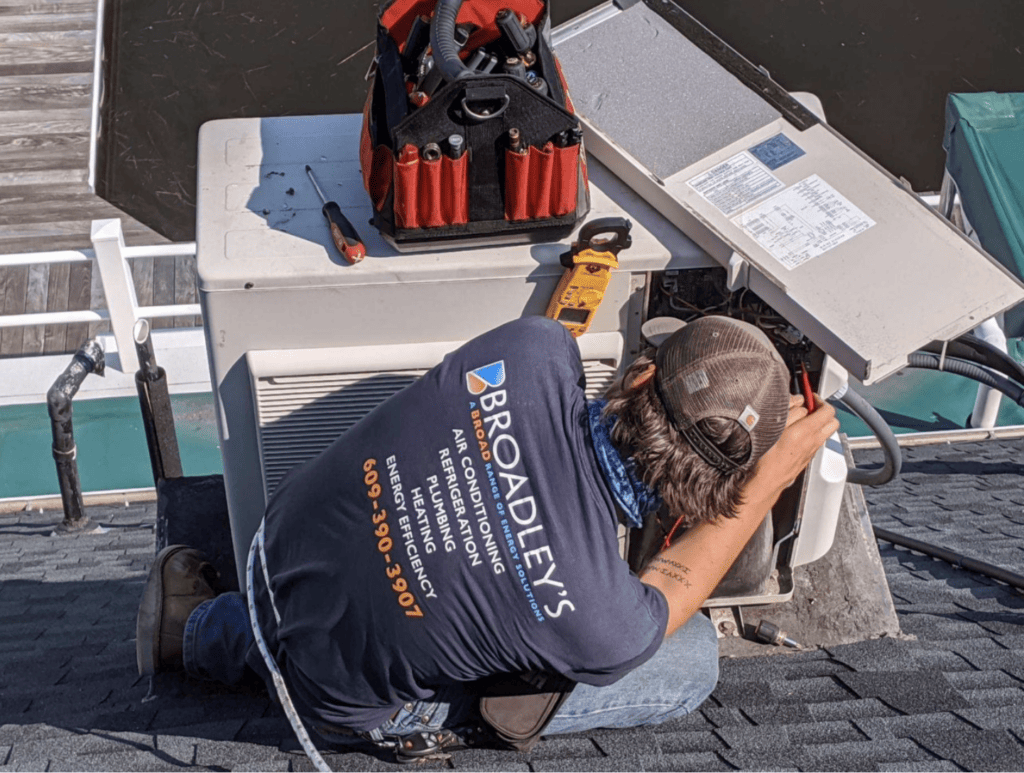Why Replacing Your AC with a Heat Pump is a Great Idea

This time of year, lots of homeowners at the Jersey Shore have to make a decision about their air conditioning system. This is the most popular time of the year to replace it, right before the summer. Replacing your conventional air conditioning system with a heat pump might be a great decision to cool and heat your home.
We’ve installed all sorts of HVAC systems around Ocean City, and the surrounding islands all up and down the South Jersey Shore. Heat pumps, central air conditioning, furnaces, water heaters… you name it. We can take a look at your home or business and make the right decision about which cooling and heating system is the best for your situation.
In this blog post, we’ll discuss how heat pumps work, the benefits of using them for cooling, and the costs and savings associated with heat pumps. We’ll also let you know about the state incentives and rebates, and how to choose the right contractor for heat pump installation.
By the end, you’ll understand why heat pumps are becoming a preferred HVAC system that saves energy and helps the environment.
Contact Us About A Heat Pump For Your Home Or Business
How Air-Source Heat Pumps Work
Heat Transfer Process
Air-source heat pumps operate in cooling mode during the summer months. The heat pump uses liquid refrigerant in a copper coil to extract heat from the indoor air as warm air naturally moves toward the cold. This hot air is then vented outside, leaving your home cool and comfortable.
Components
An air-source heat pump has two main components: an outdoor unit that resembles a traditional air conditioner and an indoor air handler. The outdoor unit contains a compressor and condenser coil, while the indoor unit houses an evaporator coil and a fan.
Ducted Heat Pumps Vs. Mini Splits

There are two types of air-source heat pumps: ducted systems and ductless mini splits. Ducted systems use your home’s existing ductwork, while mini splits require no ducts and can be installed in individual rooms or zones for better temperature control.
Read More: Ductless Mini Splits VS. Window AC
Benefits Of A Heat Pump Vs. Traditional AC
Better Comfort
Heat pumps not only cool your home in the summer but also heat it during the winter, providing year-round comfort. They also help lower indoor humidity, making your living space more enjoyable.
More Options
With ductless mini-split systems, you have the flexibility to cool or heat specific areas of your home as needed, leading to greater comfort and energy savings.
Heating and Cooling
As mentioned earlier, heat pumps provide both heating and cooling, eliminating the need for a separate furnace and air conditioner.
Lower Bills
Heat pumps are more energy-efficient than traditional heating and cooling systems, resulting in reduced energy bills and lower carbon emissions.
Saving Energy (And Money) By Replacing AC With A Heat Pump

Replacing your traditional air conditioning system with a heat pump can lead to significant energy savings and reduced greenhouse gas emissions. A study published in the Electricity Journal found that air-source heat pumps could reduce household emissions from heating in California by up to 54%.
Replacing Central Air With A Heat Pump: Climate Change Considerations
As more people seek cooling solutions for their homes, it’s essential to choose equipment with minimal climate impact. Heat pumps are an eco-friendly alternative to traditional air conditioners and furnaces, helping mitigate climate change by reducing carbon emissions. This is the main reason that heat pumps are eligible for tax credits through the Inflation Reduction Act.
Heat Pump Vs. Central Air: Cost Comparisons
Installation Pricing Up Front
The cost of installing an air-source heat pump typically ranges from $4,000 to $12,000, depending on the size, brand, and whether you use a ductless system. Comparatively, a traditional air conditioner costs $3,800 to $7,500, and a gas furnace costs $2,000 to $8,000.
Energy Bills Over Time
One of the primary advantages of replacing your AC with a heat pump is the potential for significant savings on energy bills. Heat pumps are more energy-efficient than traditional air conditioning systems, often leading to lower utility costs.
Homeowners with heat pumps can save hundreds of dollars annually, making the investment in a heat pump worthwhile over time. Additionally, reduced energy consumption means a smaller carbon footprint, contributing to a more sustainable future.
Financial Incentives to Replace An AC Unit With A Heat Pump
Federal Rebates and Tax Credits
One of the benefits of replacing your AC with a heat pump is the availability of federal rebates and tax credits. The U.S. government often provides incentives for homeowners who invest in energy-efficient upgrades, such as heat pumps. These incentives can help offset the initial costs of installation, making the switch to a heat pump more affordable.
As we mentioned above, the Inflation Reduction Act was enacted to give corporations and homeowners incentives to reduce the amount of energy they consume. Heat pumps are eligible for tax credits of 30% of the cost up to $1,200 ($2,000 for Heat Pumps).
Read More: The Inflation Reduction Act Helps With A New HVAC System
Local Utility Rebates
In addition to federal and state incentives, local utility companies like South Jersey Gas and Atlantic City Electric also offer rebates for homeowners who choose to replace their AC units with energy-efficient HVAC equipment.
These rebates can help lower the initial cost of your new heating and cooling system. We can help you figure out what the best rebates and incentives are for the equipment you need in your home or business.
If you are looking for help with a new heat pump or air conditioning system for your home, give Broadley’s HVAC a call at (609) 390-3907, or click here to schedule online!
